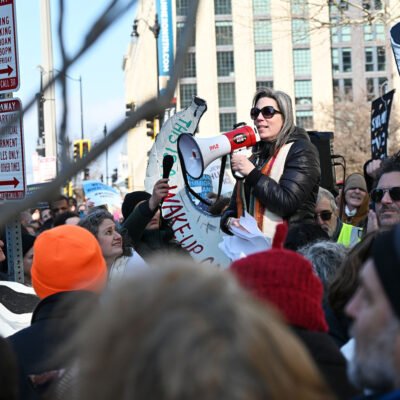Downsizing after a divorce was painful but financially smart. I decided to house hack, opening my Victorian Brooklyn brownstone to Airbnb guests and hoping to bring life to my cash-starved bank account and a spark to my stately home.
Well, I got more sparks than I bargained for.
Relocating to a lower floor, I was awoken in the night by clattering and knocking like a ship on the high seas, along with loud groans. I was sure the whole neighborhood could hear. It turned out that my 100-year-old home was being used for more than a simple short-term stay.
Whenever the same repeat guest booked, my grand old manse may as well have been an X-rated film set. Upon the guests’ departure, I immediately looked into making sure they never came back. But according to Airbnb’s rules at the time, if I refused guests at short notice, my online ranking would drop fast—and with it, the prospect of future income.
My Tenants Were Airbnbing Their Apartments Without My Knowledge and Allowing Movie Shoots
It wasn’t my only bad experience with Airbnb. I’d wondered why my long-term tenant disappeared on weekends and why I’d find lockboxes around the exterior railings. It turned out she was working a side hustle without my knowledge, subletting her apartment to short-term guests.
Another time, my neighbor asked me, “What film were they working on?”
“Film?” I responded, confused.
“Yeah, there was a whole film crew here. Actors, lighting, sound guys. Like 20 people,” he said. “I assumed you knew about it.”
I didn’t.
The Shorter the Booking, the Greater the Likelihood of Problems
I learned a lot about Airbnb as a host before New York City banned vacation rentals under 30 days. The basic rule of thumb was that the shorter the booking, the more likely problems would occur. This was especially true during national holidays, resulting in Airbnb banning one-night stays over Memorial Day and the Fourth of July.
“In the off-season, bookings drop,” Max Kostyashkin, president of MAK Realty, who short-term rents high-end condos at the famed Fontainebleau Hotel in Miami, told BiggerPockets. “That’s summer in Miami, when the rates go down and the caliber of guests takes a nosedive, too.”
Kostyashkin manages condos owned by associates, investors, and family members. “Instead of weeklong bookings at high rates in peak season, in the offseason, we get one-to-two-day bookings and 50% of our peak rates. That’s when we see more problems.”
Always Have Insurance
Kostyashkin tells this story:
“We had one incident before New Year’s a couple of years ago, when a suite was booked by a group of guys in their mid-20s. Roughhousing must have occurred, because one went through a giant framed mirror, which was secured to the wall with four wooden corners. He claimed he was asleep and that the mirror had fallen on him, which was impossible. He got cut pretty badly and ended up going to the hospital and requiring stitches and wound up with a $4,000 hospital bill.”
“The guest blamed us and tried to get money. We spoke to Airbnb, who agreed that the story made no sense. The guests gave us a bad review, and because the mirror was custom-made and part of a condo in an upscale hotel, it had to get replaced. The room was closed down for a week. As business owners in the hospitality business, we have full-time vacation rental insurance, but ultimately, we lost money through no fault of our own.”
Beware of Vacation Rentals in High-Rise Buildings
Miami is a unique, wildly popular Airbnb market. Vacation rentals are welcomed in certain parts of the city, and a surge of Airbnb-compliant condos is in the works. However, Kostyashkin urges caution to other Airbnb landlords and hosts who think overseeing vacation rentals in a high-rise will be smooth sailing.
“Anything in your rental can affect the whole building,” he says. “Five years ago, one of our guests burned down the room. We’re talking tens of thousands in damages. The entire building had to be evacuated, all 37 floors. Like many Airbnb owners, he was trying to do it on the cheap and never had insurance, so he had to pay the entire bill.”
One Bad Event in Your Neighborhood Can Affect Every Vacation Rental Nearby
A headline-grabbing Airbnb horror story can affect other vacation rentals nearby, resulting in business suffering. The city can get involved, and even banks might become wary of financing other vacation rental projects nearby.
For example, two years ago, two teenagers were killed and eight others wounded when a party at an Airbnb in Pittsburgh‘s North Side, attended by over 200 people, went south. It was the third time in nine days that gunfire had erupted at Airbnb parties. Pittsburgh’s City Council soon proposed tougher laws regarding Airbnb and limiting the length of stays.
At the time, I was in the middle of financing my own multifamily Airbnb project nearby. My lender also funded the building where the shooting had taken place and warned me against short-term rentals. For a while, I thought they might decline my loan.
The property manager I used installed a sophisticated noise-monitoring system and another that detected the number of cell phones in use in the building as a safeguard against uninvited guests and parties. So far, so good.
Final Thoughts
For every vacation rental horror story, many more investors have cultivated profitable businesses without the hassle of dealing with eviction or having full-time tenants.
If you’re looking for a passive investing experience, while vacation rentals are tougher to do passively, a good vacation rental software like Hospitable can make it much easier. Hospitable can help put your vacation rental on autopilot by automating 90% of guest messages, syncing calendars across all platforms, streamlining cleaning team reminders, and more.
Ready to succeed in real estate investing? Create a free BiggerPockets account to learn about investment strategies; ask questions and get answers from our community of +2 million members; connect with investor-friendly agents; and so much more.
Note By BiggerPockets: These are opinions written by the author and do not necessarily represent the opinions of BiggerPockets.




